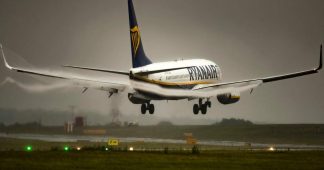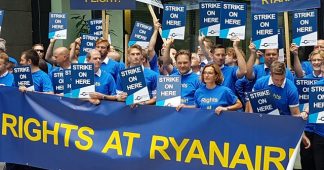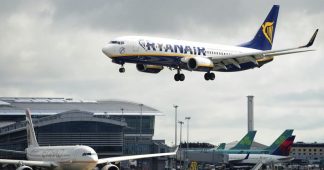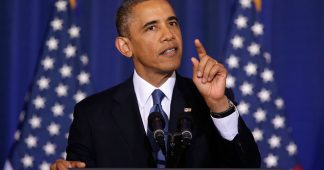By Barry Mason and Robert Stevens
10 August 2018
There are numerous issues involved in the ongoing strikes in Ireland, Belgium, Sweden, Germany and the Netherlands against low-cost airline Ryanair, but the underlying impulse is the growing anger provoked by the appalling conditions facing both pilots and cabin crew.
Working long hours for poor pay in a high-pressure job, with the safety of thousands of people in their hands, places intolerable strains on Ryanair staff.
One week ago, on August 3, pilot Captain Jouke Schrale was found dead in his car. It was parked in the Ryanair staff car park at the southern Spanish airport of Malaga. It is believed he committed suicide and that his body had lain undiscovered in the car for at least 24 hours.
Colleagues found him after mounting a search when he failed to report for duty to pilot an 8.30 a.m. flight from Malaga to Brussels’ South Charleroi airport. One colleague told the media he was very concerned because Jouke had never missed a flight in over 10 years of flying.
A Dutch national, Jouke had been a pilot with Ryanair for just over 11 years, since 2007. He was a base captain for Ryanair at Charleroi from October 2007 to February 2016. From February 2016, he worked as a pilot in Malaga and was living at the time of his death with his Belgian partner, Jessica, in Mijas near Malaga.
While the circumstances leading to his suicide are not clear, the manner in which he was found—in a staff car park before he was due to fly a plane—points to work-related issues.
On Monday, a Spanish pilot, Ivan Palacios, writing on his blog, noted that after supporting a recent strike in Spain 300 Ryanair cabin crew are being threatened with dismissal.
He notes that Schrale’s tragic death is not the first suicide among Ryanair crews.
In 2011, Paul Ridgard, a first officer working for Ryanair based in Liverpool, took his own life in a hotel at nearby Manchester Airport.
According to the RyanairDontCare campaign blog, Ryanair demonstrated a total lack of care for Ridgard when he was suffering mental distress caused by family deaths and illness. According to a whistleblower, Ridgard could not get leave to attend his father’s funeral and had to work that day. He had been advised by friends to get a doctor’s sick note and take time off work, but he was reportedly fearful of what it would mean for his work record.
The RyanairDontCare blog notes that Ridgard was refused unpaid leave to try and deal with the issues. He was in the process of doing his command upgrade training and was told unofficially he would not be upgraded when he took part in a test flight. It was following this revelation that Ridgard committed suicide.
The RyanairDontCare campaign was set up in 2008 by John Foley in response to the treatment of his daughter. She had been employed as a stewardess when her contract was suddenly terminated while working on a shift. This left her stranded abroad with no means to get home. Foley discovered this had happened to other Ryanair cabin crew prior to their probationary period ending.
In his blog, Ivan Palacios points to a situation in which another Ryanair pilot, who was suffering major stress as a result of being placed under severe pressure to work, almost caused a catastrophic incident.
“A well-known case was that of a Ryanair Commander who, unfortunately, suffered the loss of his little son of only 3 years of age. As in the case previously commented on involving the death of pilot Paul Ridgard’s father, this commander was denied leave due to his mental state and was only given one day off for the burial of his son, forcing him to fly the following day. So as not to lose his job, the pilot accepted this and the next day flew a plane with the added ominous coincidence that his co-pilot was a beginner for whom this was his first day working for Ryanair.
“When after the flight they made the final approach to the airport of destination, Lisbon, the commander went into crisis due to the death of his son and went into shock, which knocked him out and left him unable to control the aircraft.
“The inexperienced co-pilot, took over the controls but could barely steer the Boeing 737 towards a safe area, entering with full force the sensitive security area surrounding Lisbon Airport and causing chaos by crossing without authorization several approach zones, full of planes that were either leaving or arriving in Lisbon. A catastrophe loomed, but miraculously there was no collision. After a few minutes the commander regained consciousness and managed to land the plane.”
In autumn of last year, Ryanair was forced to cancel hundreds of flights because of problems arising from the introduction of a new rostering schedule and a chronic lack of staff. In a September 20 Guardian article former Ryanair pilot James Atkinson wrote, “I was a captain for Ryanair from 2006 to 2014, and these cancelled fights do not surprise me. What I witnessed in those eight years left me shaking my head, and the current estimate that more than 700 Ryanair pilots have quit the airline in the last financial year does not surprise me either.”
Explaining some of what he had been through, Atkinson recalled, “Meanwhile, the fatigue of flying for Ryanair is quite real. When I was there, I was regularly sent out of my base to fly on my days off, and without pay—to distant Ryanair bases that had a staffing shortage. I would take connecting flights and sometimes overnight layovers to arrive (hotel paid by me, and not reimbursed). Once there, I would report for duty, fly a heavy flight schedule for five consecutive days, then face the arduous journey back to my home base. If it was summer, I’d usually have only three days back at home before embarking on another such trip. It was a soul-destroying experience.”
The terrible pressure on Ryanair staff is not exclusive to that company, which for over 30 years has systematically cut costs and set new benchmarks in increasing profitability at the expense of its workforce. In March 2015, Anreas Lubitz was the co-pilot on a Germanwings flight from Barcelona in Spain to Dusseldorf.
Germanwings is the low cost budget subsidiary of the Lufthansa airline.
After locking out the pilot from the cabin, Lubitz deliberately flew the plane into the ground over the French Alps, taking the lives of 149 passengers and crew.
Ryanair and other airlines have imposed these conditions with the full collaboration of the trade unions. Aware of the record of the unions in working with other airlines and collaborating with them in enforcing attacks on terms and conditions, as well as job cuts, last December Ryanair agreed to begin recognising unions. This decision was taken even as Ryanair declared it would continue to expand its operations, cut costs and ramp up profitability.
Vereinigung Cockpit (VC) officials in Germany spoke for their counterparts everywhere at a press conference this week when they said they were not interested in pursuing demands beneficial to the workforce, but only wanted a collective bargaining deal.
VC president, Martin Locher, said, “In the interests of Ryanair passengers, we really don’t want to strike. But with the work stoppages, we want to consciously send the company a sign that it is our concern, now finally, finally to enter into constructive collective bargaining.”
For the bureaucracy this means raking in membership dues in return for acting as an industrial police force on behalf of management. For pilots and cabin crew it means ever more brutal levels of exploitation.
Also read
Ryanair pilots stage European-wide strike
Ryanair strikes timeline as airline struggles with escalating industrial action











